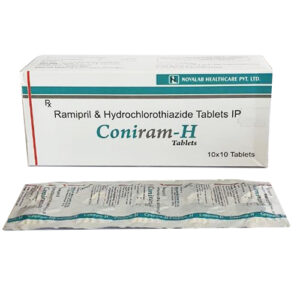- Home
- CARDIAC/DIABETIC PRODUCTS
- Metoprolol succinate


Metoprolol succinate is a cardiovascular medication belonging to the beta-blocker class. It’s commonly used to treat hypertension (high blood pressure), angina (chest pain), and heart failure. By blocking the effects of adrenaline on the heart and blood vessels, it reduces heart rate and blood pressure, ultimately improving the heart’s efficiency and reducing strain. Unlike the immediate-release form, metoprolol succinate has a sustained-release mechanism, allowing for once-daily dosing. This extended-release formulation ensures a more gradual and consistent drug effect. Regular use can help manage cardiovascular issues by maintaining stable heart function and controlling blood pressure.
Benefits of Using Metoprolol succinate
Metoprolol succinate offers several benefits for cardiovascular health. As a beta-blocker, it effectively controls hypertension by lowering blood pressure and heart rate, reducing the workload on the heart. It’s also valuable for angina, as it decreases the heart’s oxygen demand, alleviating chest pain. Metoprolol succinate’s sustained-release mechanism ensures consistent and convenient once-daily dosing, enhancing medication adherence. Moreover, it can improve outcomes in heart failure by enhancing cardiac function and lessening symptoms. Overall, this medication’s ability to regulate heart rhythm, ease strain on the heart, and manage various cardiovascular conditions makes it a crucial tool in promoting heart health.
How to Use Metoprolol Succinate
Metoprolol succinate should be used as prescribed by a healthcare professional. Typically taken orally once daily, it’s important to follow the prescribed dosage and timing consistently. The medication can be taken with or without food, but the method should remain the same to ensure stable blood levels. Avoid crushing or chewing the extended-release tablets, as they’re designed for gradual release. Missing a dose should be avoided, but if forgotten, take it as soon as remembered unless close to the next scheduled dose. It’s essential not to abruptly stop the medication, as this can lead to adverse effects; gradual dose reduction under medical guidance is advised. Regular medical check-ups are recommended while using Metoprolol succinate.
How Metoprolol succinate Works
Metoprolol succinate works by blocking the effects of adrenaline on the heart and blood vessels. As a beta-blocker, it binds to beta receptors, primarily in the heart, reducing the heart’s response to stress signals. This leads to a lowered heart rate, decreased force of heart contractions, and relaxed blood vessels. Consequently, blood pressure is reduced, and the heart’s oxygen demand is diminished. These actions collectively enhance the heart’s efficiency, decrease its workload, and aid in managing conditions like hypertension, angina, and heart failure, promoting cardiovascular health and stability.
Precautions While Using Metoprolol succinate
When using Metoprolol succinate, certain precautions are essential. Adherence to prescribed dosage is crucial, as abrupt discontinuation can lead to adverse effects. Individuals with heart conditions, asthma, diabetes, or certain allergies should inform their healthcare provider, as Metoprolol can interact with other medications. Regularly monitor blood pressure and heart rate, as the medication might cause bradycardia. Caution is advised when engaging in activities requiring alertness, as Metoprolol can cause dizziness or fatigue. Avoid alcohol and consult a doctor before surgery, as the medication might interact with anesthesia. Regular medical check-ups and open communication with healthcare professionals are strongly recommended.
Side Effects of Using Metoprolol succinate
Metoprolol succinate might lead to various side effects. Common ones include fatigue, dizziness, and a slower heart rate. Some individuals might experience cold extremities, shortness of breath, or mild gastrointestinal issues. Rarely, it could cause mood changes, depression, or allergic reactions. Serious side effects include severe dizziness, fainting, or difficulty breathing. An exacerbation of heart failure symptoms can occur if not used correctly. Diabetic patients should monitor blood sugar levels as Metoprolol can mask low blood sugar symptoms. Alert your healthcare provider promptly if any side effects are concerning. Regular medical check-ups can help manage potential complications and ensure safe medication use.
Related products
We are a research-based pharmaceutical company. The mission of Novalab Healthcare is to improve the health of the Indian community by providing them with quality
Quick Links
Location
- Plot No-208, Industrial Area Phase 1, Panchkula, Haryana 134113
- Novalab7777@gmail.com
- +91-9570599567
- +91-9115604598




